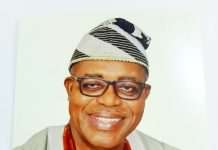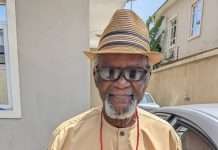Until its dissolution in July 2015, Pharm. Bruno Nwankwo was chairman of the Pharmacists Council of Nigeria (PCN). A native of Umuabiama village, Ajali, Anambra State the pharmacist was educated at Government Secondary School, Owerri. He graduated from the Nigerian College of Arts, Science and Technology, first with a diploma in 1963 and followed it up with B.Pharm from the University of Ife in 1966. In this interview with Adebayo Folorunsho-Francis, Nwankwo bares his mind on the journey so far and why he thinks pharmacists need to upgrade.
Tell us briefly about your work experience
I worked briefly in research before the Nigerian Civil War started. I worked at the General Hospital, Enugu, and also rendered some war services. After the war, I went back to the Ministry of Health in Enugu, before I joined Ciba Geigy in August 1970 as medical representative and, later, head of division, executive director and chairman. I was with them until 1992 when I retired.
Can we say your official work experience started in the hospital?
To some extent, yes. I had a chequered career. After my diploma, I started working immediately with Lagos Island Maternity, a general hospital committed to the health of women. But after one year, I joined a small pharmaceutical company (Arco) as a medical representative. Then in 1965, we (those with diploma) went back to the university for a one-year programme (Part 3) of the B.Pharm. My journey to the general hospital in Enugu was a war-time affair where everybody had to go.
Whose decision was it for you to study Pharmacy?
It was a personal decision but a circumstantial one, though. Like every other young man in my day, I had my eye on Medicine since we were Biology or science-inclined. In my second year A Level at Nigerian College, Enugu, it turned out that the government announced that there would be no scholarship to study medicine. However there was a scholarship to study Pharmacy. Therefore, I had to make a switch. That was why I mentioned earlier that it was circumstantial.
In retrospect, did you regret taking that step?
I don’t think so. It has been challenging, not quite as rewarding as one had earlier hoped. But I don’t regret because that is where I find myself.
How would you rate today’s practice compared to your time?
Pharmacy practice in our day was probably not as advanced and evolving as it is today. You will get more contents in the practice today. There is also more technology now unlike when we came out. Again, the practitioners have evolved in line with best practices outside and improved in competence and technology.
There are complaints that most pharmacists are not meeting up with expected standard. Why is that?
I will say less commitment. Most pharmacists are largely less committed. Job satisfaction, to some extent, is also less. I view it from two points. First is that the reward system is not as good as one will expect. But again, the professionalism is not there because many of the Fellows today want to be more than one thing at the same time. They are not developing themselves as required by the demand of the patient or demand of the products. The pharmacopoeia in our day was very limited. Therefore, it was easy for us to know everything that we needed to know. But today, the array is so wide that you need to work extra hard to know what the various products are, their merits and demerits, where they can be better than others and where they are not as good as others so that you can be of service to the patients and the doctors. It is only then you can say, “Doctor, it is advisable to use this formulation” and so on. Today’s pharmacists are not necessarily on board because of their lack of dedication. They are always trying to do more than one thing almost at the same time. They want to be called a pharmacist and want to be called a contractor at the same time. And they are not there to do the job they present themselves to do. So there is that constraint.
How best can the perennial problem of drug counterfeiting be curbed?
Public enlightenment is one thing. Knowledge by the pharmacist himself is another thing. He must be competent in recognising the tell-tale signs of fake drugs. He must also be competent in terms of advising the not-so-literate patients on what to do. Information is important from the point of view of the patient.
There is nowhere in the world that is free of counterfeiting. It is a matter of relativity. At a point in time, it was rampant in Nigeria. We have not been able to wash away that slur off the character of the Nigerian pharmaceutical market. But a lot has been done in terms of creating awareness, technology for identification, pharmacovigilance and reporting.
We must acknowledge that we have come a long way. More can still be done by reducing counterfeiting further through public enlightenment and, of course, through economic empowerment. This is because many of the people who patronise fake drugs do so out of poverty. During one of our meetings at the last PSN conference in Abuja, a patient was said to have been shown two products – one fake, the other genuine. Having been briefed about their nature and prices, he was asked which one he would go for. The patient still ended up choosing the fake because it was what he could afford. It is a hydra-headed monster.
What is your view about pharmacists in politics?
Great. Although I cannot go myself because I cannot really face what it takes. For me, it is a rugged terrain which I am not cut out for. But certainly, politics rules the world and we cannot get what we need except we are politically well-placed.
How active are you especially in pharmaceutical activities?
I think I have been there right from my student days. I was president of PANS in my time. My association with Pharmacy and the struggles of Pharmacy date back to my student days. When I came out after the war, I was assistant national secretary for two years. I’ve been involved in projecting pharmacy interest within the industry, mentoring the young ones, getting involved in continuing education in Pharmacy through presentation of papers at workshops, colloquiums and others. I think I have done the bit I could. Even as a Fellow of the Society, I was the past chairman of the Board of Fellows.
Are there some honours or awards to show for your selfless services?
I am a Fellow of the PSN, Fellow of WAPCP, Fellow of NAPharm. etc. Most of the awards I can have as a pharmacist in Nigeria, I already have and I am proud of them.
If you were to choose another profession outside Pharmacy, what would it be?
As I said earlier, I wanted to be a doctor. Maybe I would have turned out to be one. I have not thought of veering into any other profession outside.
What is your advice to young pharmacists looking up to you?
Commitment and dedicated service to your profession and the patient is important. They should also work for self-fulfilment.














